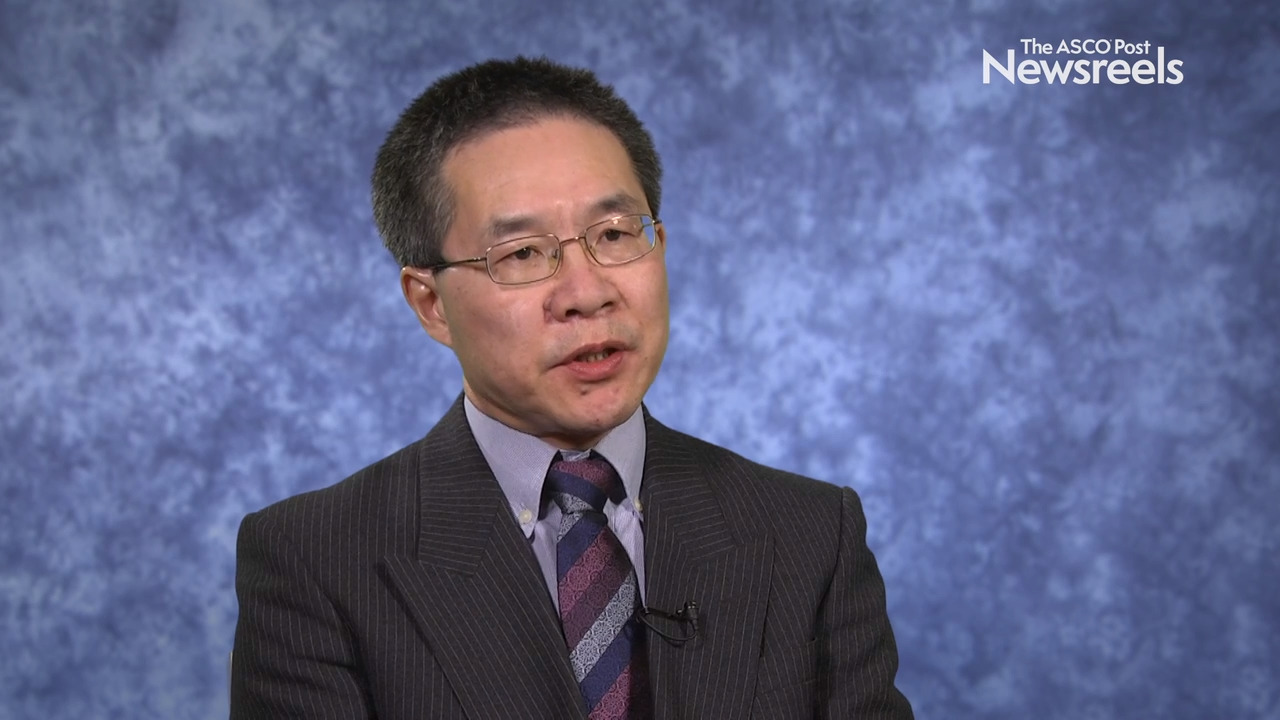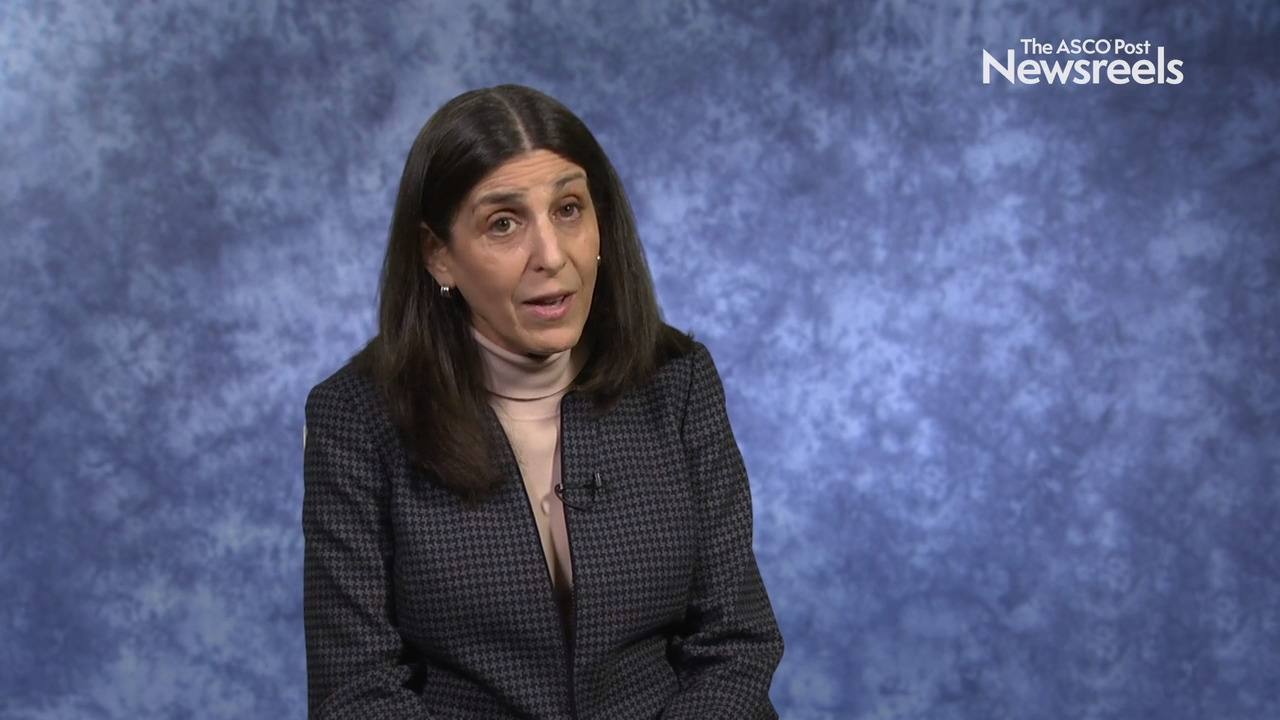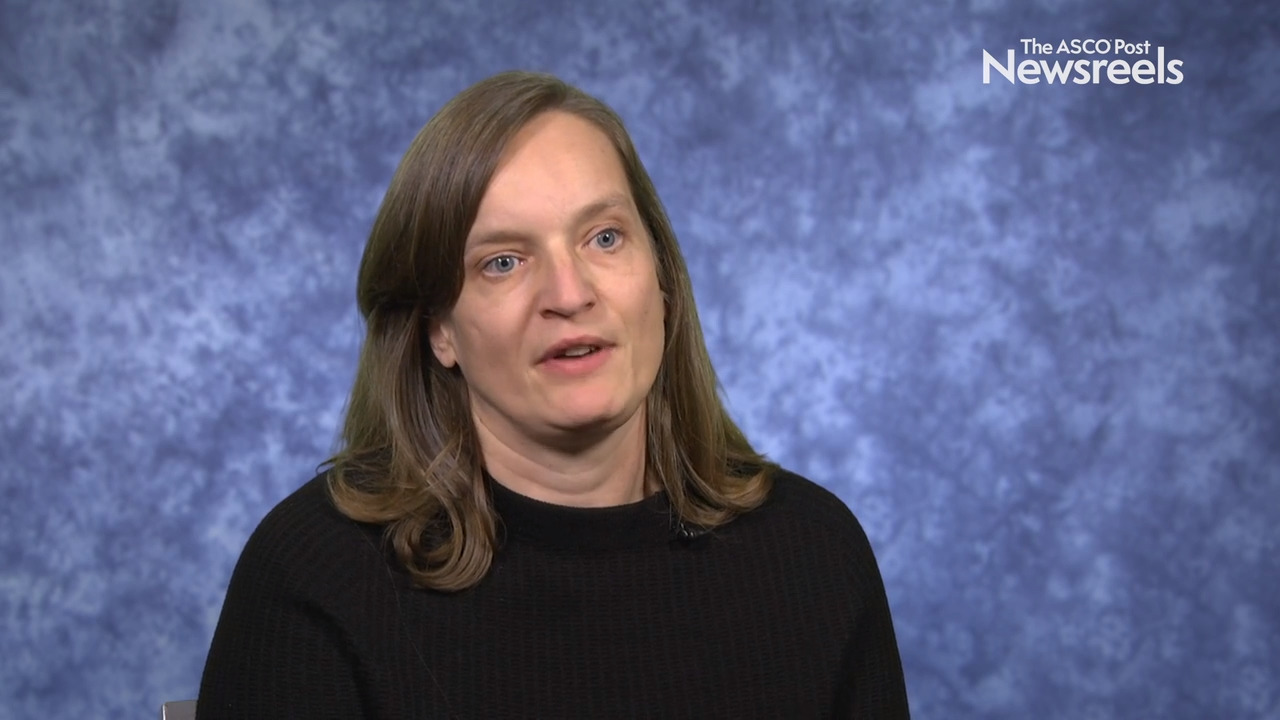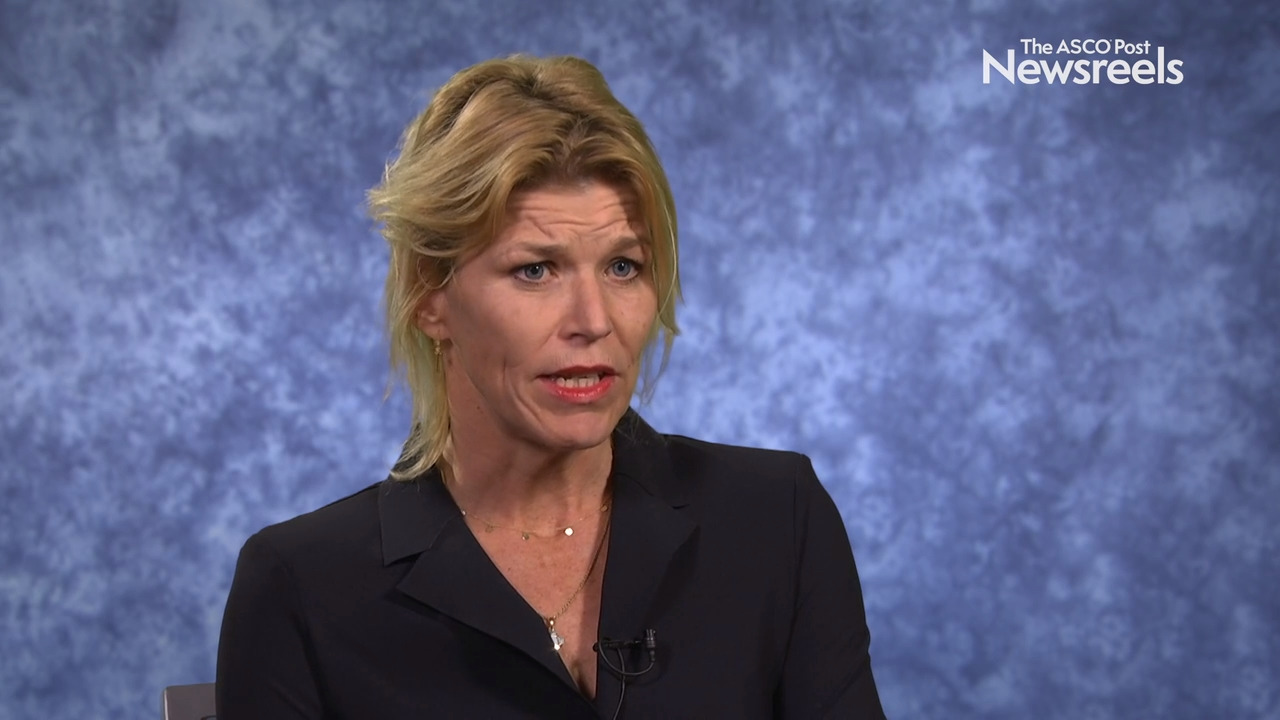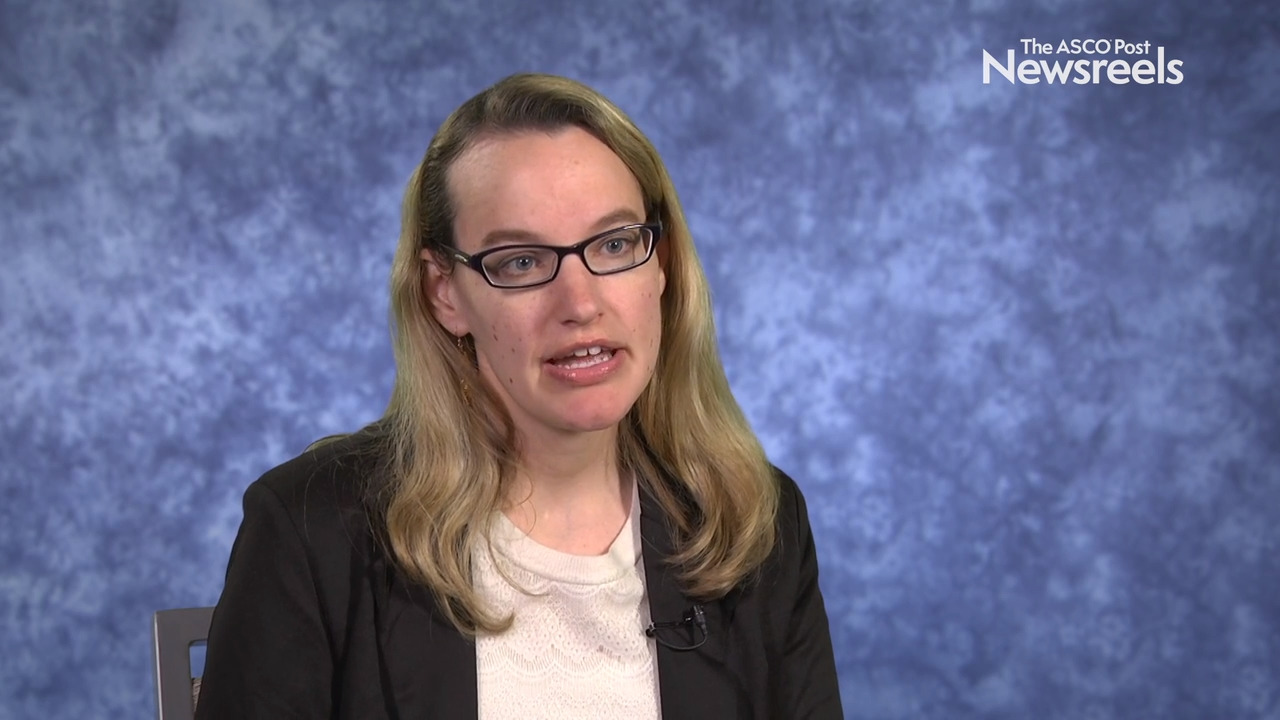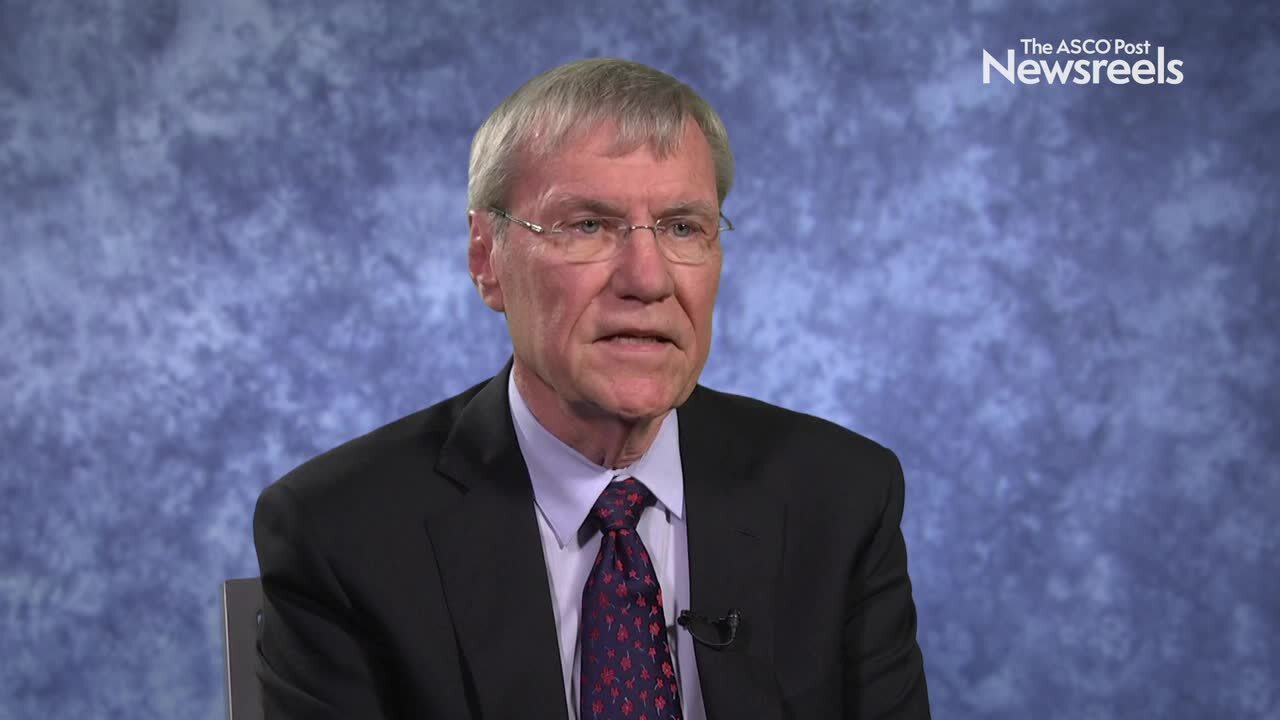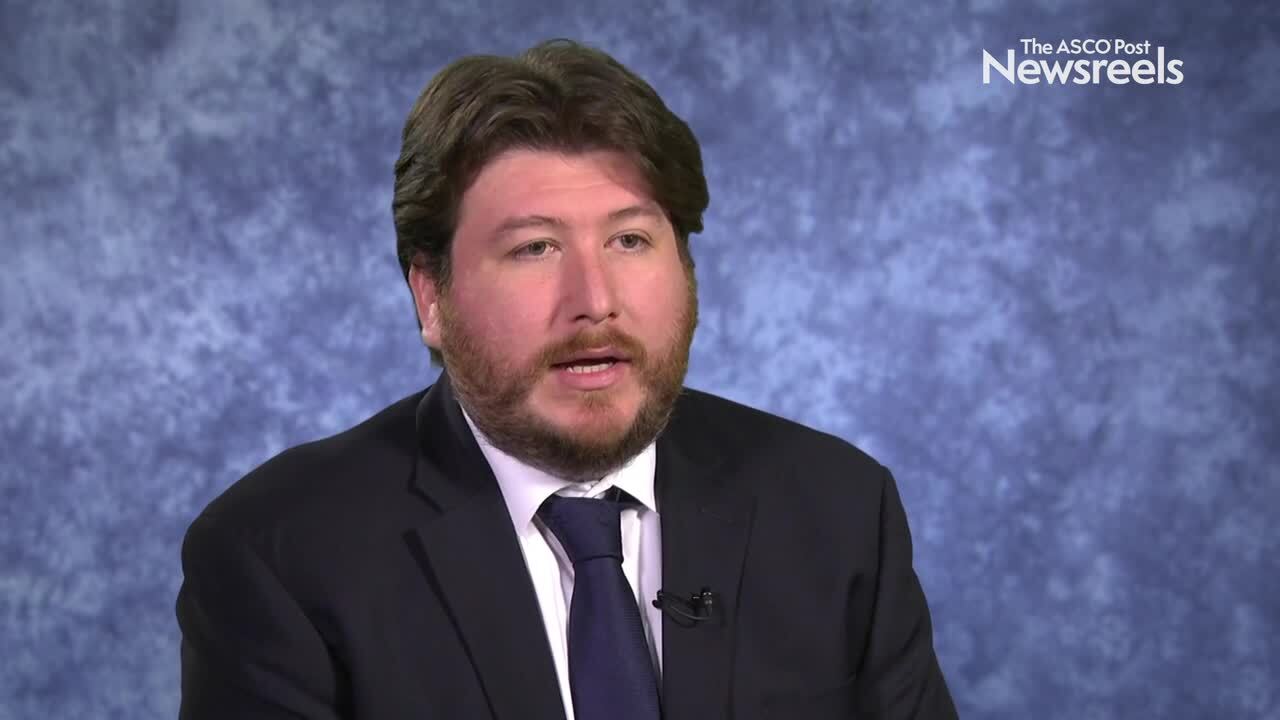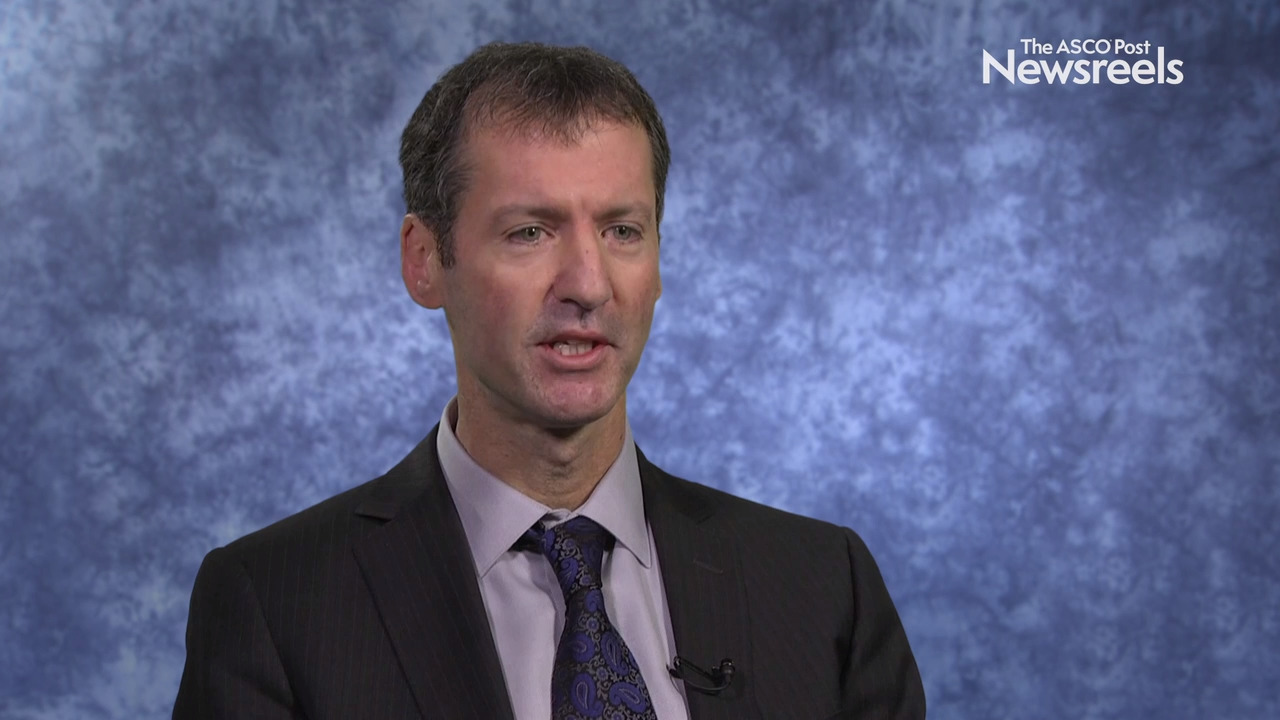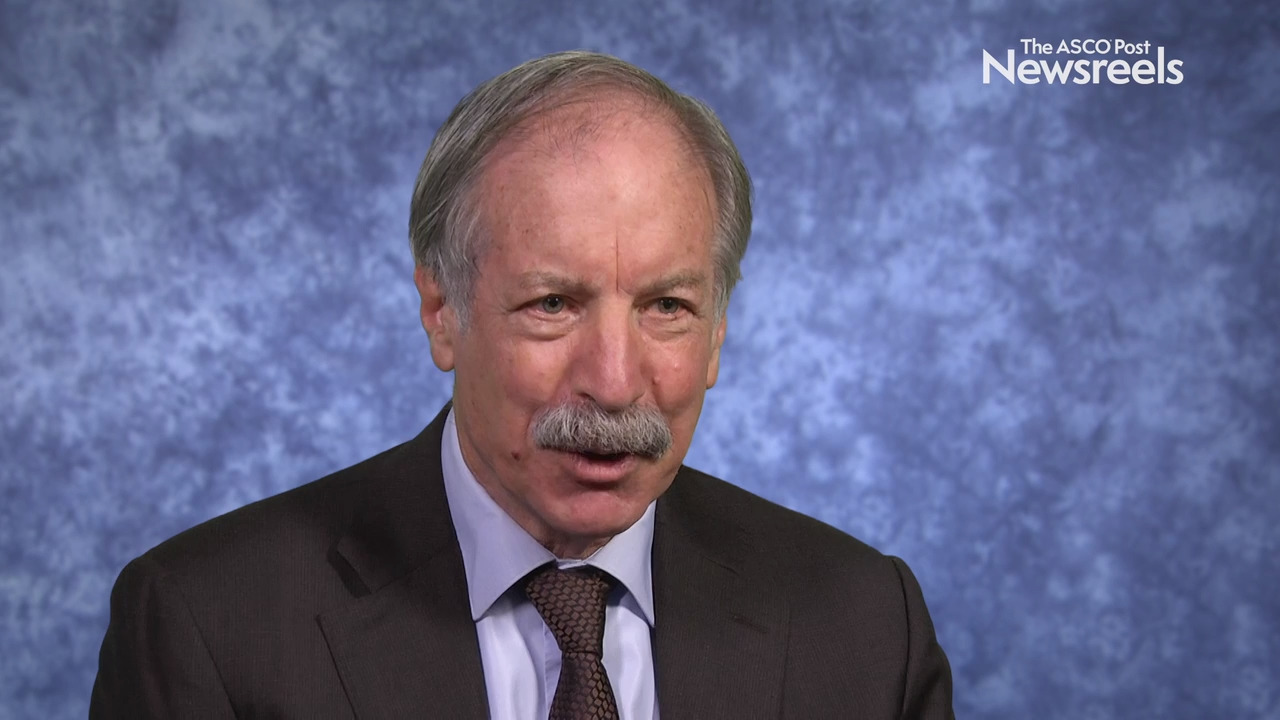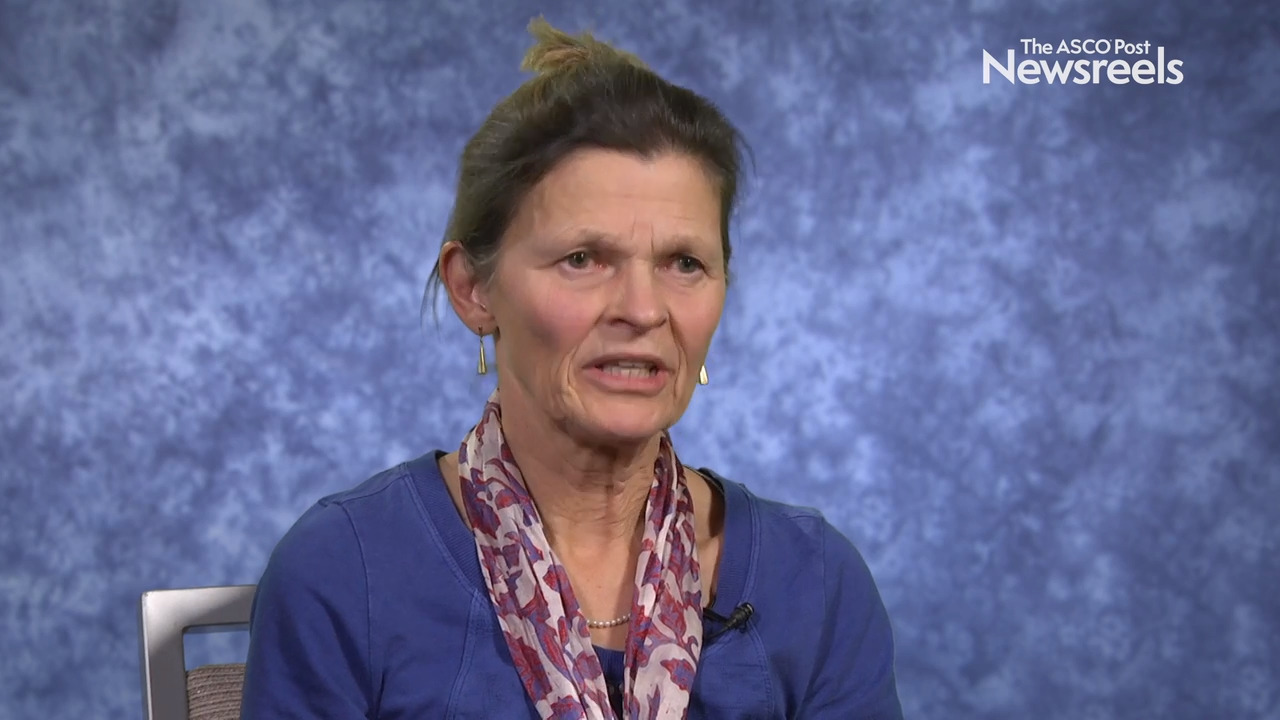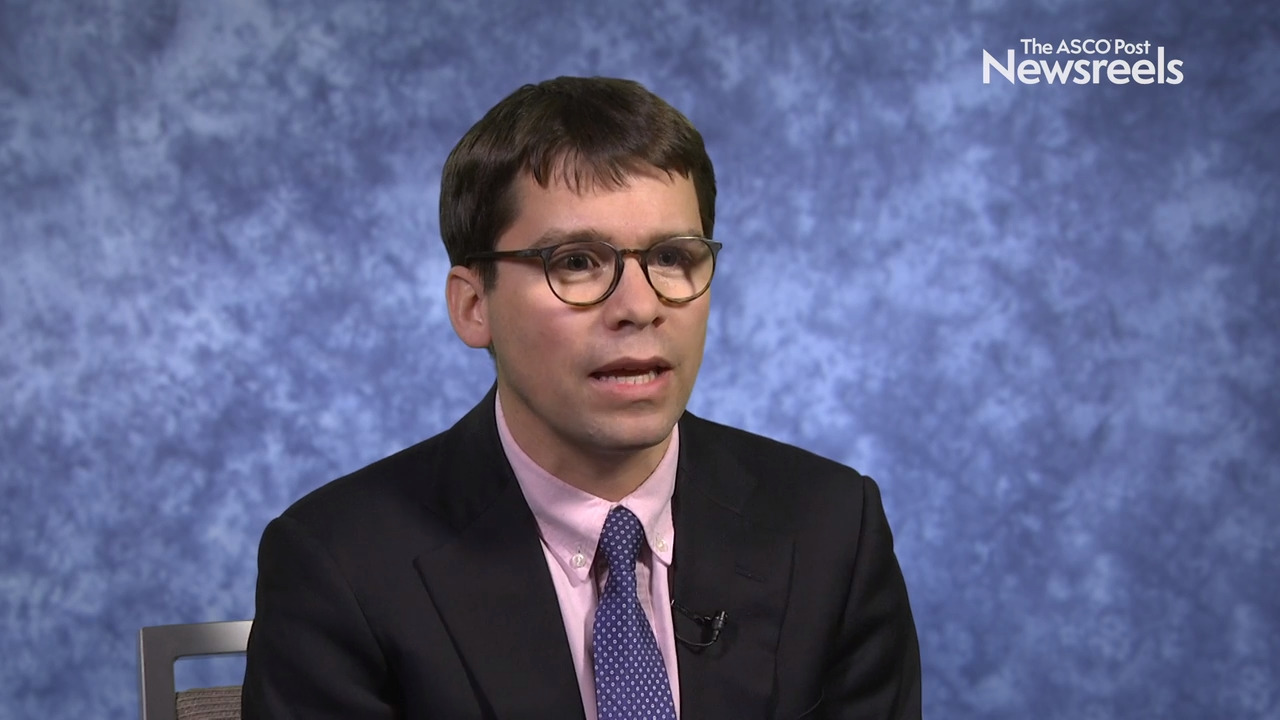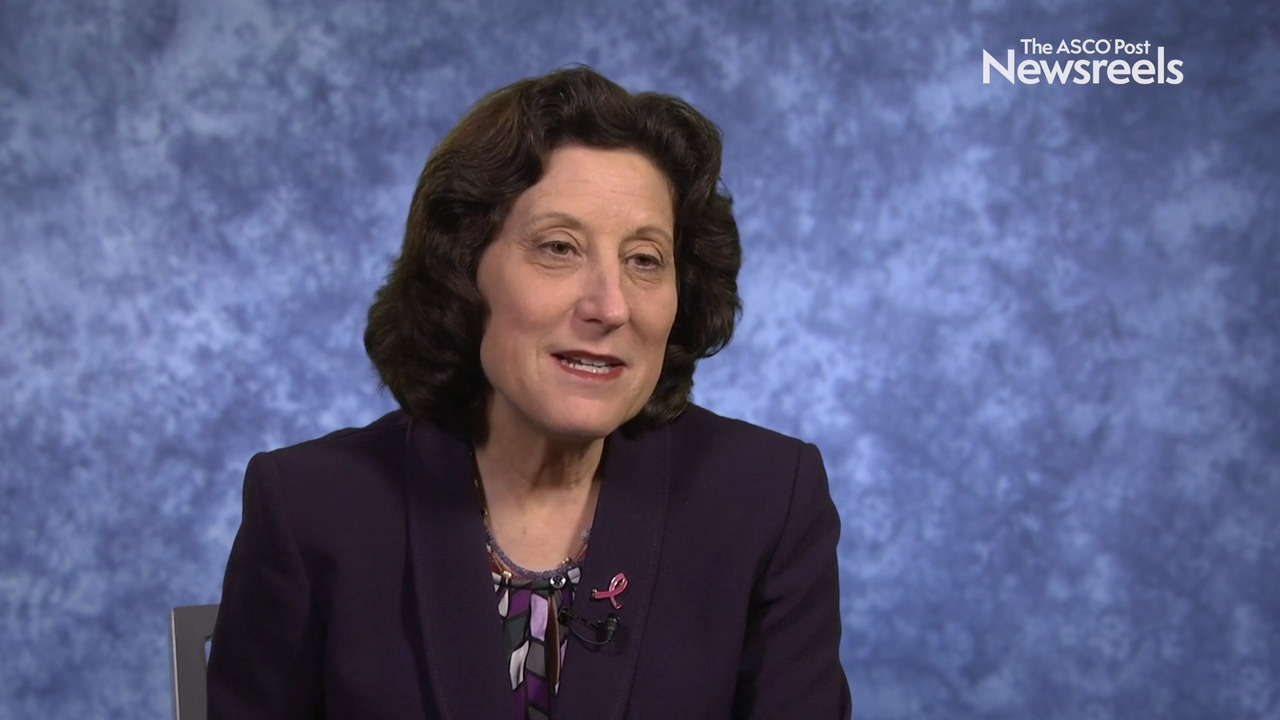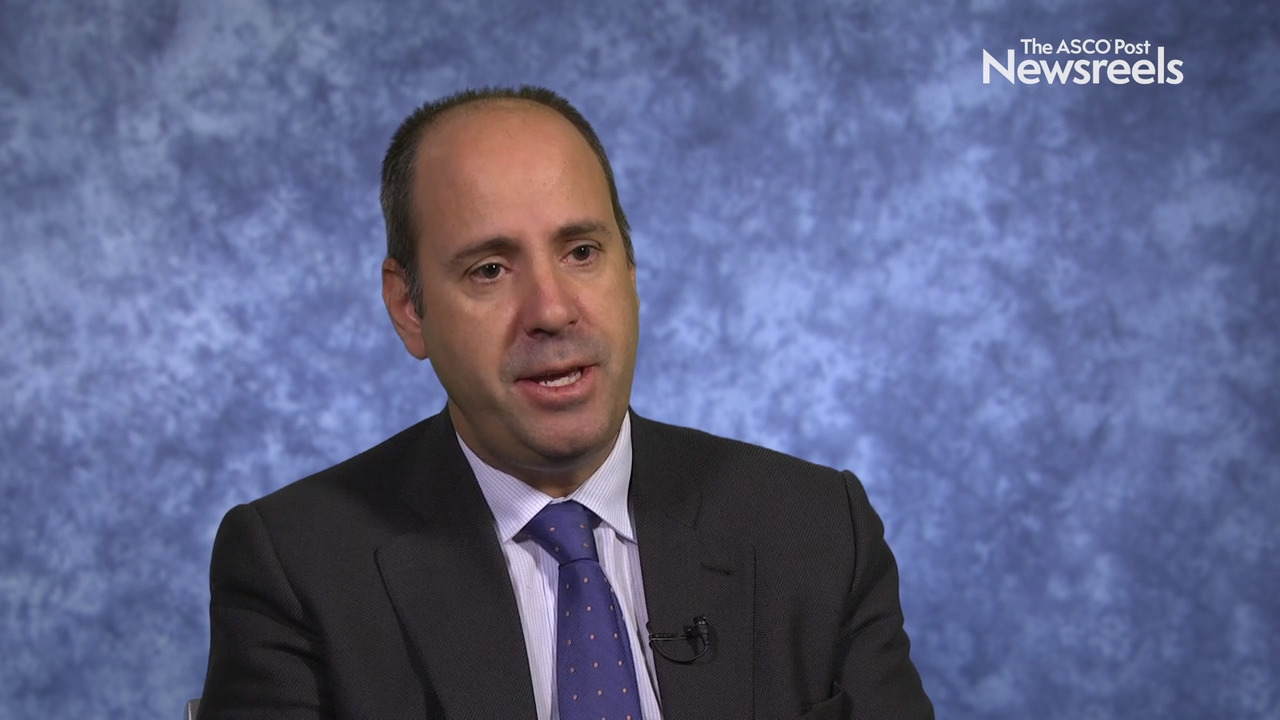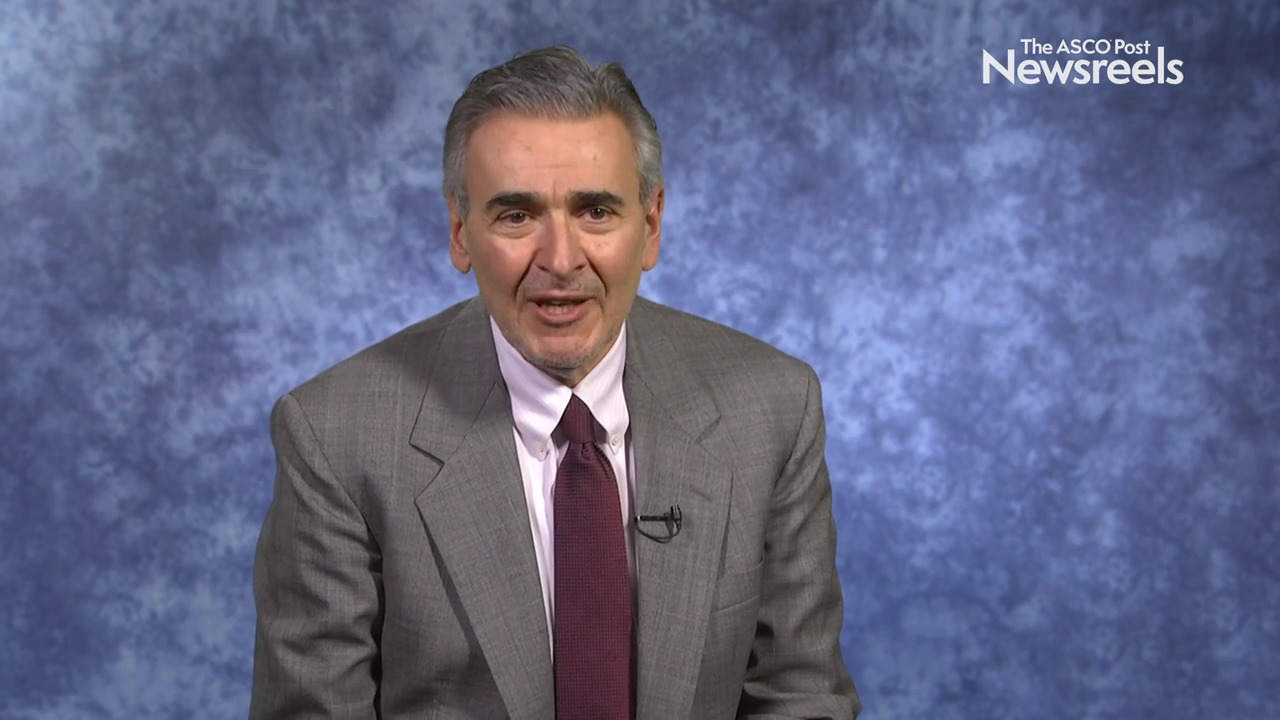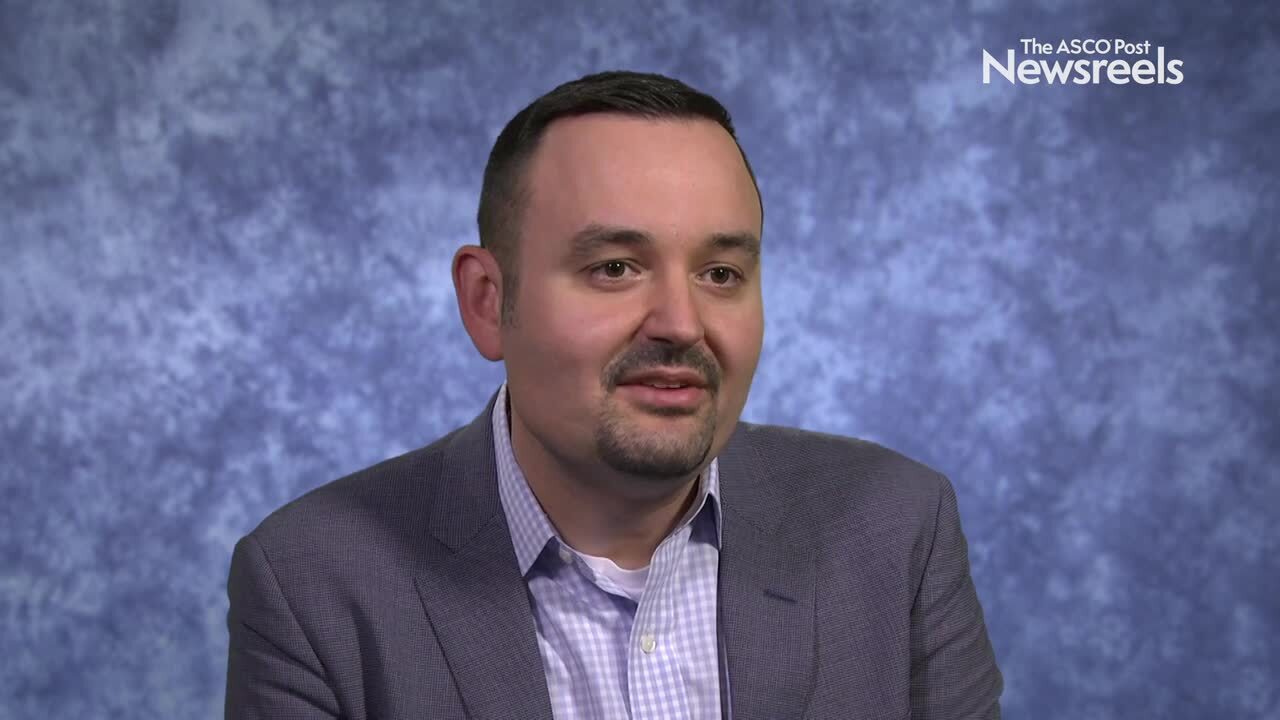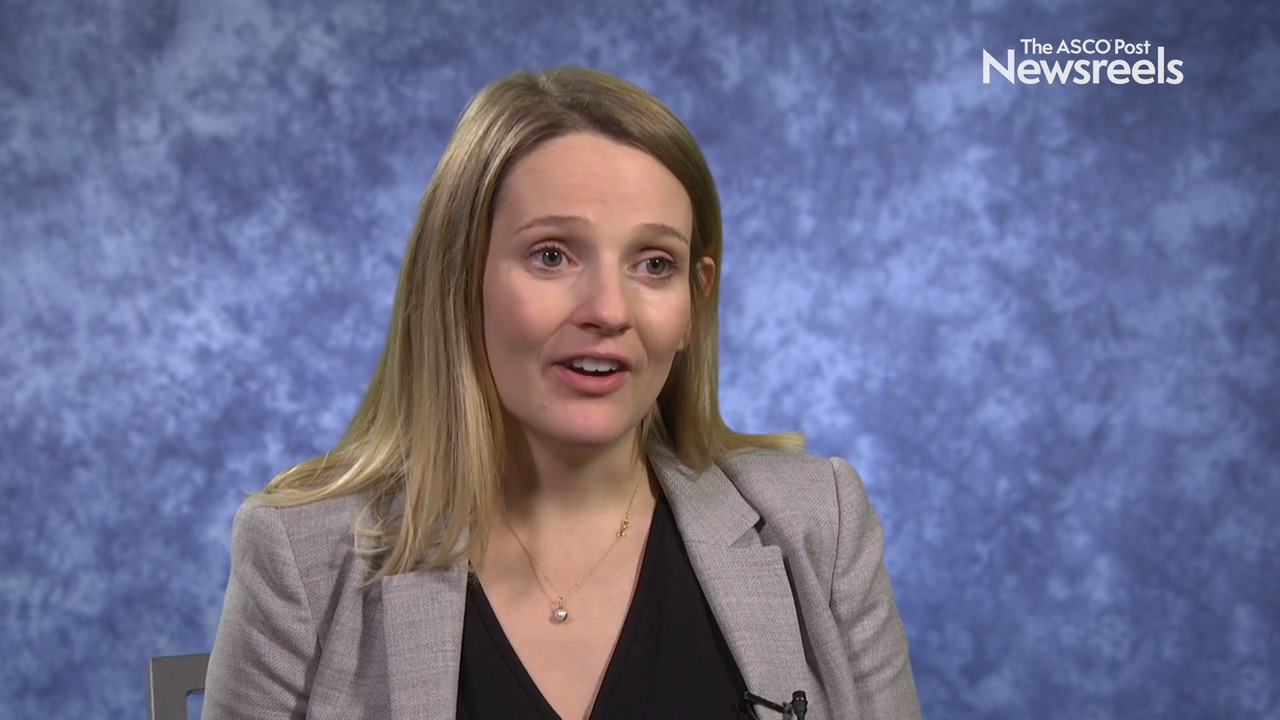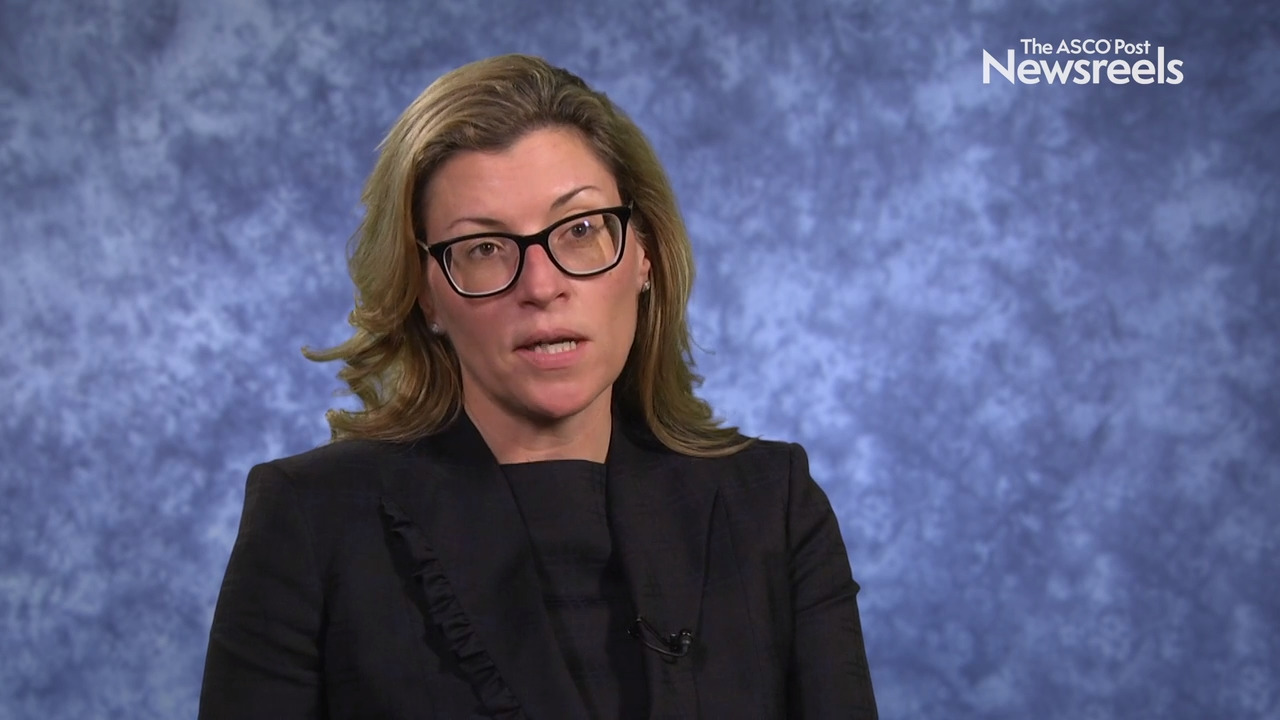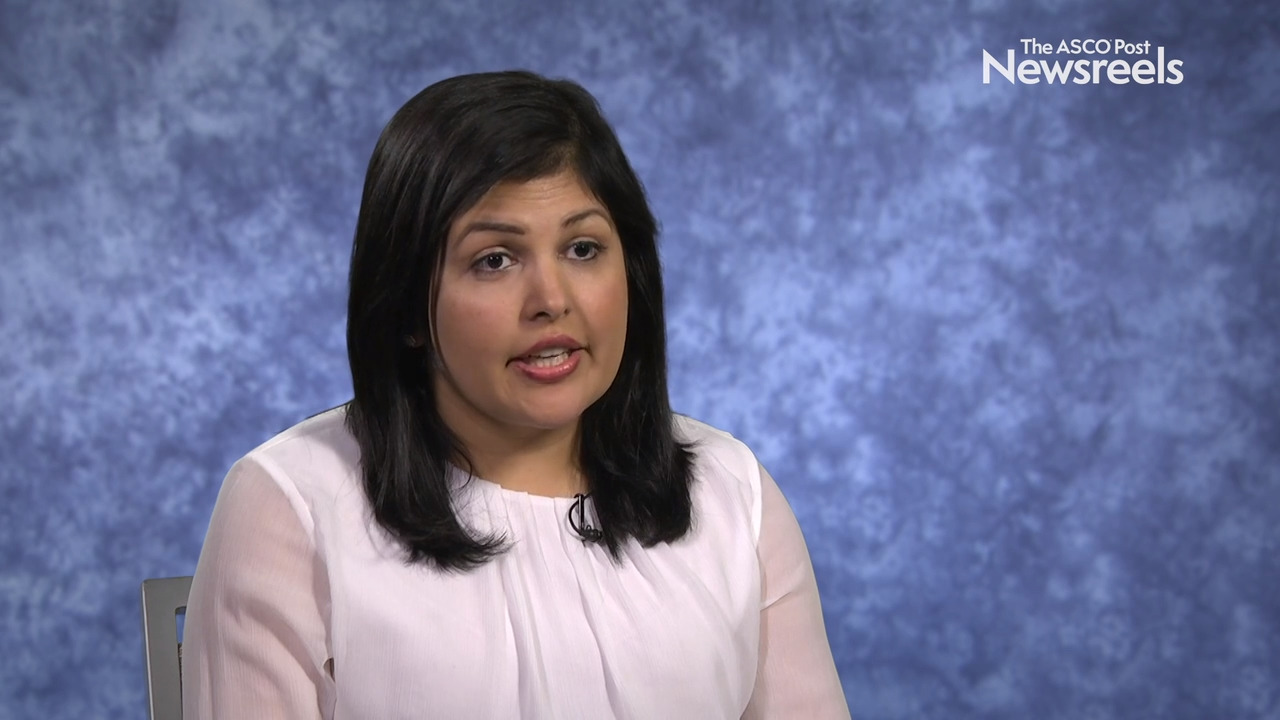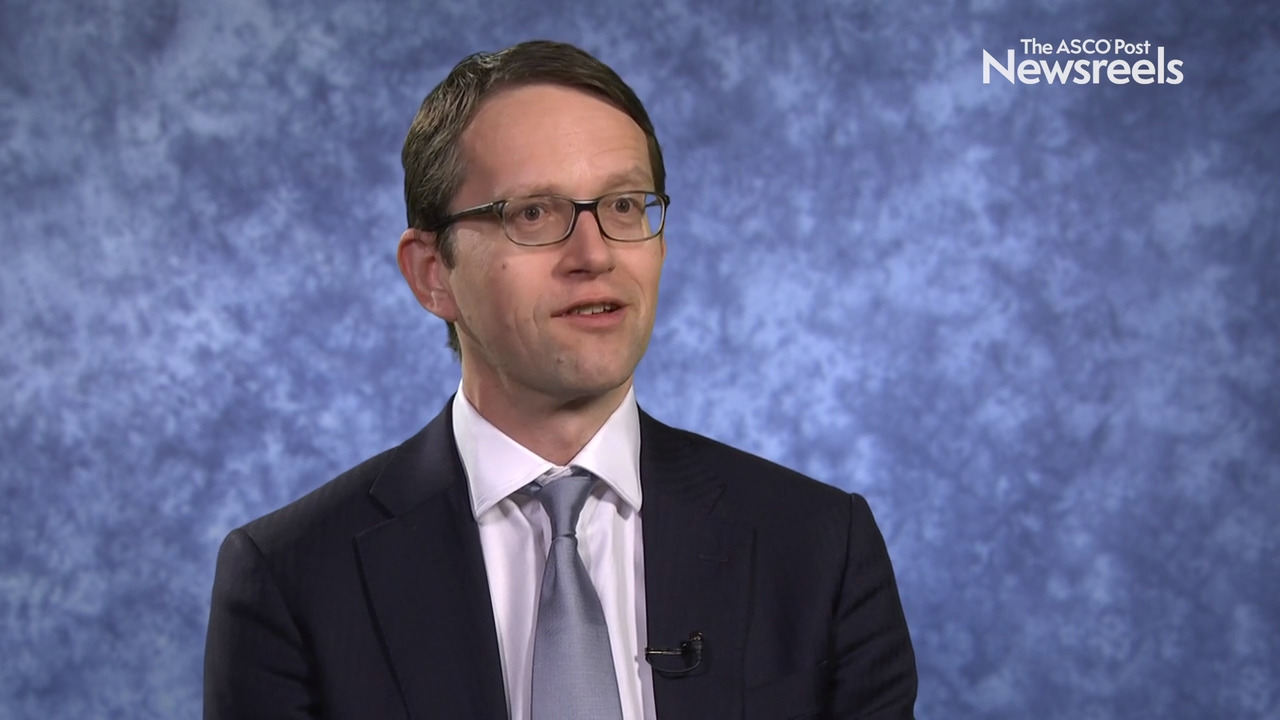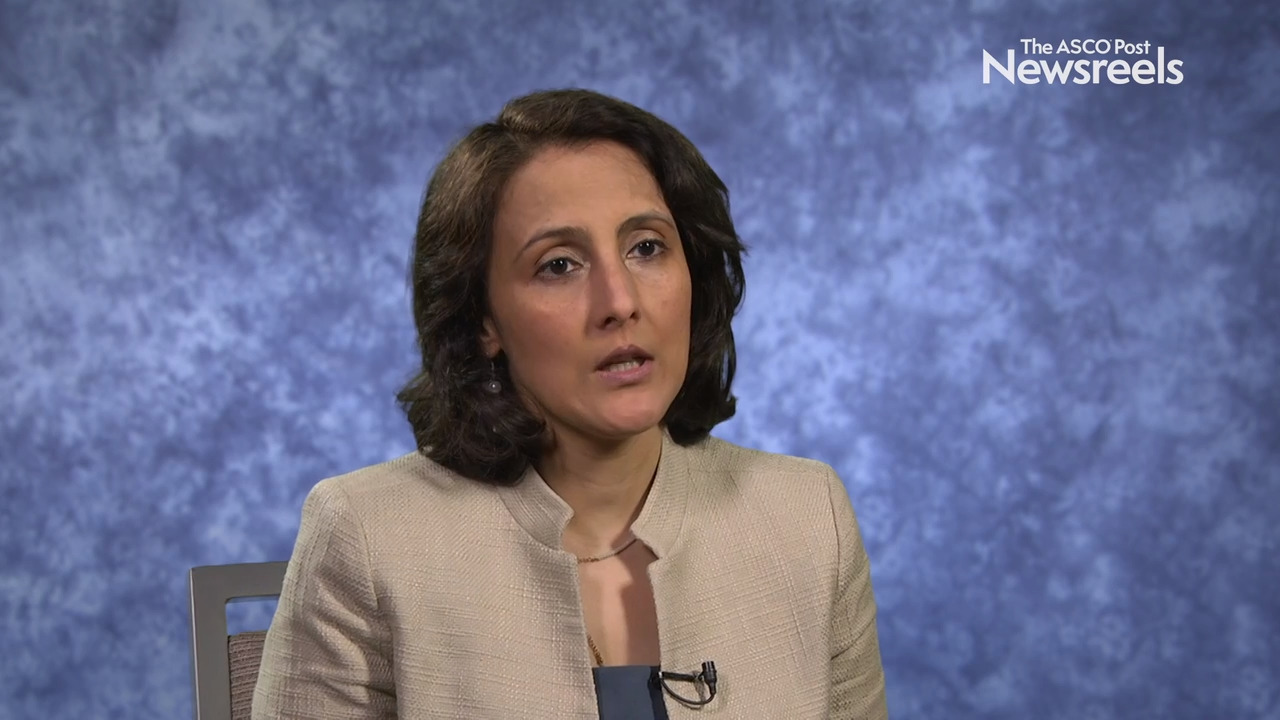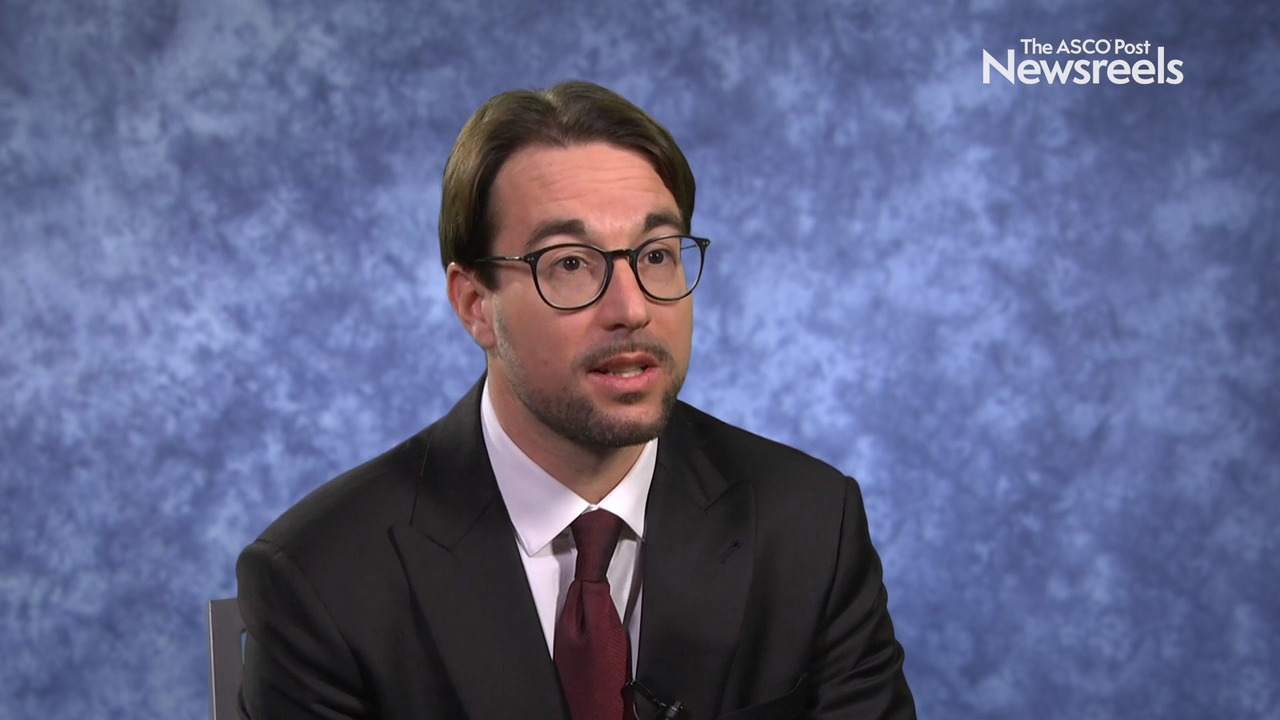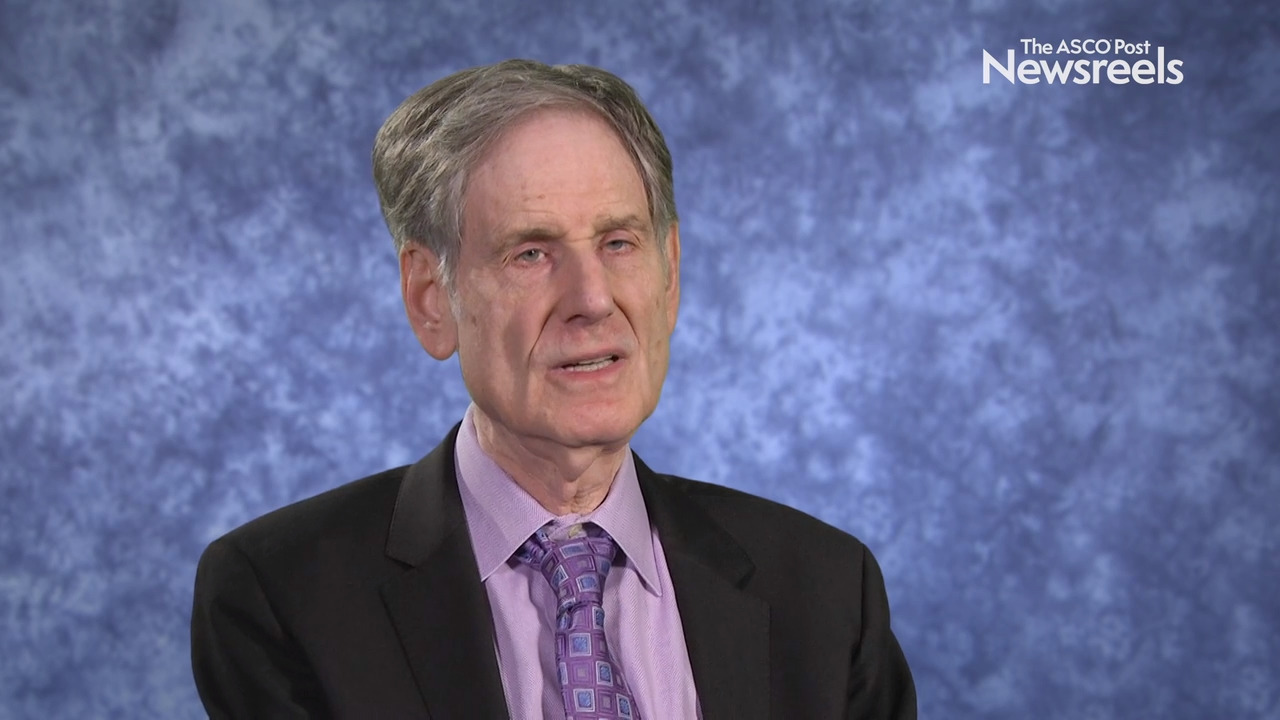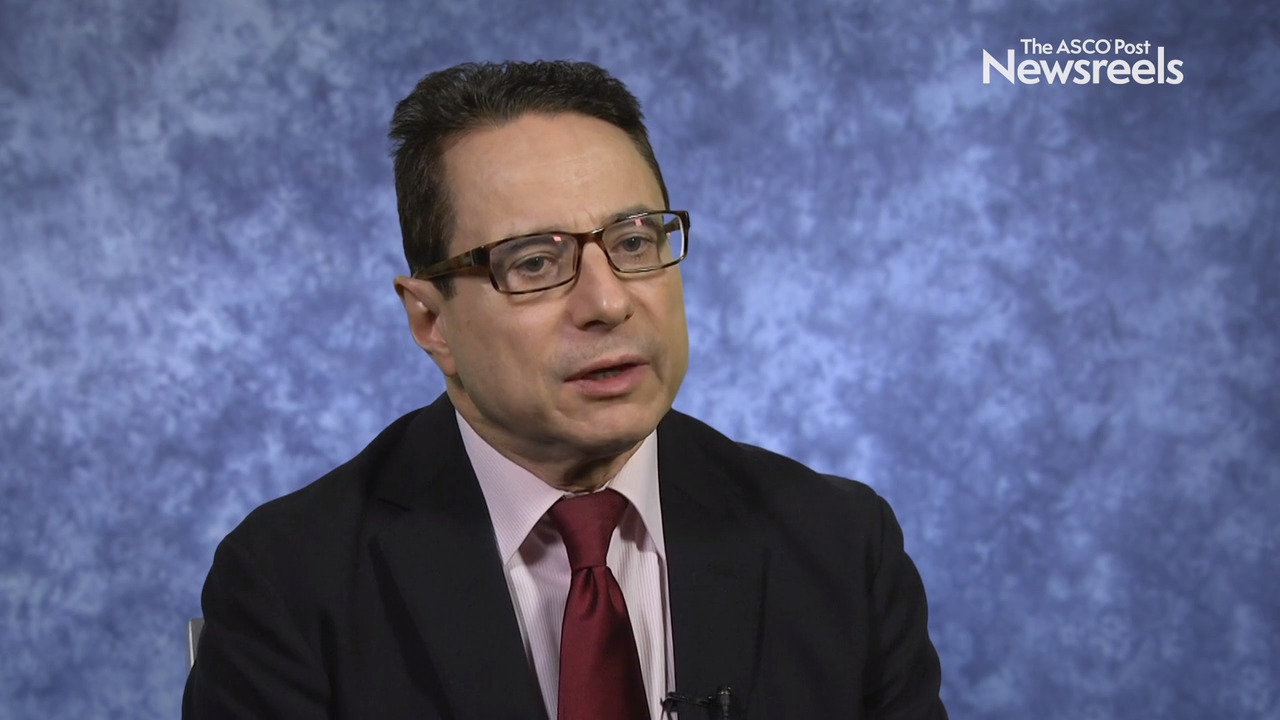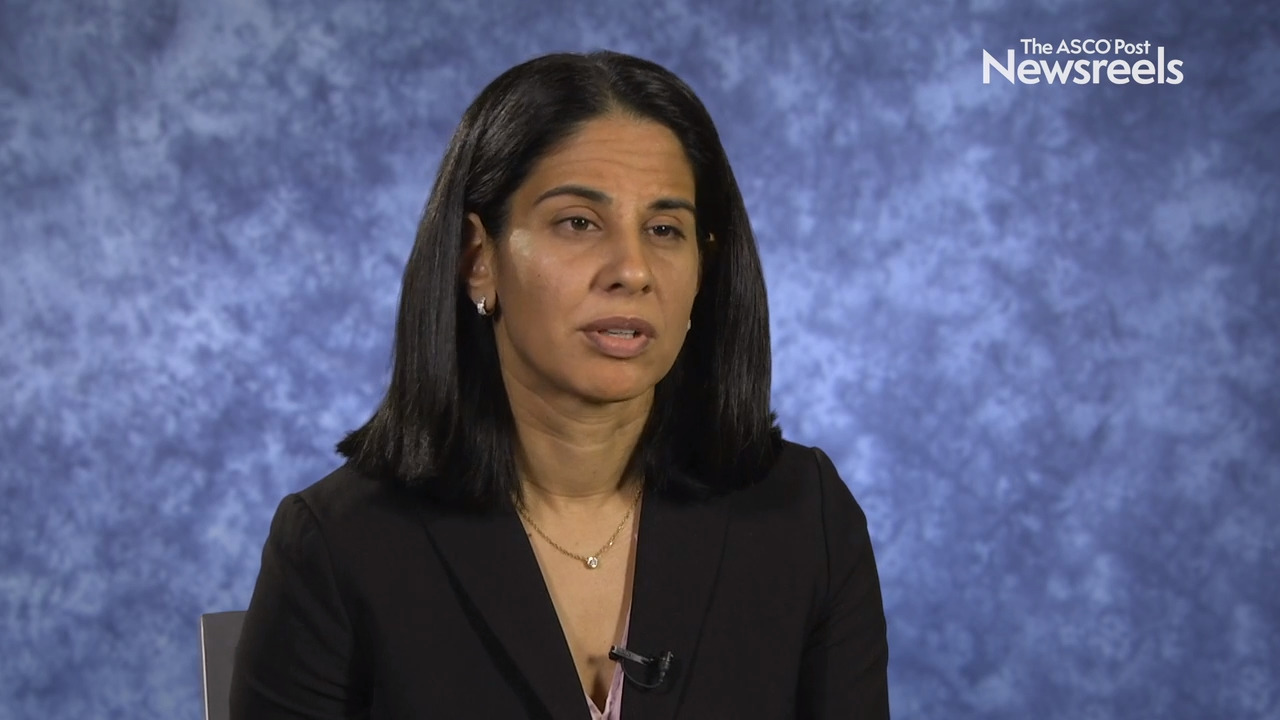2019 San Antonio Breast Cancer Symposium
Hongchao Pan, PhD, on an Update on 5 Years of Endocrine Therapy for Early Breast Cancer
Hongchao Pan, PhD, of the University of Oxford, discusses an analysis of 86,000 women in the Early Breast Cancer Trialists’ Collaborative Group database, which showed that the risk of distant recurren...
Nadine M. Tung, MD, on HER2-Negative Breast Cancer: INFORM Trial of Cisplatin vs Doxorubicin/Cyclophosphamide
Nadine M. Tung, MD, of Beth Israel Deaconess Medical Center, discusses cisplatin vs doxorubicin/cyclophosphamide (AC) as neoadjuvant treatment in BRCA-mutation carriers with HER2-negative breast cance...
Ivana Sestak, PhD, on Clinical Treatment Score From TAILORx: Predicting Distant Breast Cancer Recurrence
Ivana Sestak, PhD, of Queen Mary University of London and the Centre for Cancer Prevention, discusses study findings that confirm the prognostic ability of the Clinical Treatment Score at 5 years (CTS...
Marie-Jeanne T.F.D. Vrancken Peeters, MD, PhD, on Omitting Breast Surgery: Results of the MICRA Trial
Marie-Jeanne T.F.D. Vrancken Peeters, MD, PhD, of the Netherlands Cancer Institute, discusses an interim study analysis showing that ultrasound-guided core biopsies of the breast in patients with exce...
Ariella B. Hanker, PhD, on Therapeutic Implications of HER2 and HER3 Mutations in Breast Cancer
Ariella B. Hanker, PhD, of UT Southwestern Medical Center, discusses data showing that breast cancers expressing co-occurring HER2 and HER3 mutations may require the addition of a phosphoinositide 3-k...
Rowan T. Chlebowski, MD, PhD, on Breast Cancer: Findings From The Women’s Health Initiative
Rowan T. Chlebowski, MD, PhD, of the Lundquist Institute at Harbor-UCLA Medical Center, discusses the long-term influence of using estrogen plus progestin or estrogen alone on breast cancer incidence ...
Gerardo Antonio Umanzor Funez, MD, on Metastatic Breast Cancer: Comparing IV and Oral Formulations of Paclitaxel
Gerardo Antonio Umanzor Funez, MD, of Liga Contra El Cáncer, discusses phase III findings on intravenous (IV) paclitaxel and oral paclitaxel plus encequidar (a novel P-gp inhibitor), the first orally ...
Ian E. Krop, MD, PhD, on Trastuzumab Deruxtecan for Patients With Previously Treated, HER2-Positive Metastatic Breast Cancer
Ian E. Krop, MD, PhD, of Dana-Farber Cancer Institute, discusses phase II trial findings on trastuzumab deruxtecan, a HER2-targeting antibody-drug conjugate, in patients with HER2-positive metastatic ...
Jack Cuzick, PhD, on the International Breast Cancer Intervention Study II: 10-Year Results
Jack Cuzick, PhD, of Queen Mary University of London, discusses the substantially greater benefits of anastrozole as compared with tamoxifen in terms of preventing breast cancer, with no increase in f...
Madeleine M.A. Tilanus-Linthorst, MD, PhD, on MRI vs Mammography: Comparing Cost and Effectiveness
Madeleine M.A. Tilanus-Linthorst, MD, PhD, of Erasmus University, reports data from the first randomized trial comparing MRI breast cancer screening with mammography in women with a familial risk. Bec...
Joerg Heil, MD, PhD, on Image-Guided Vacuum-Assisted Breast Biopsy
Joerg Heil, MD, PhD, of the University Hospital Heidelberg, discusses findings on how accurately this technique can diagnose residual disease and pathologic complete response after neoadjuvant chemoth...
Hope S. Rugo, MD, on HER2-Positive Metastatic Breast Cancer: SOPHIA Trial of Chemotherapy Plus Margetuximab or Trastuzumab
Hope S. Rugo, MD, of the University of California San Francisco Comprehensive Cancer Center, discusses trial data on margetuximab plus chemotherapy, which improved progression-free survival in patient...
Javier Cortes, MD, PhD, on Triple-Negative Breast Cancer: Results From the KEYNOTE-119 Trial of Pembrolizumab vs Chemotherapy
Javier Cortes, MD, PhD, of the IOB Institute of Oncology, discusses study findings that suggested pembrolizumab offered a prolonged survival benefit compared to chemotherapy for a subset of patients w...
Joseph Sparano, MD: The William L. McGuire Memorial Lecture
Joseph Sparano, MD, of the Montefiore Medical Center, discusses three challenges: How can gene-expression profiles and other diagnostic tests be used to guide the use of adjuvant systemic therapy? ...
Milan Radovich, PhD, on ctDNA After Neoadjuvant Chemotherapy and Recurrence in Triple-Negative Breast Cancer
Milan Radovich, PhD, of Indiana University School of Medicine, discusses trial findings that show patients with triple-negative breast cancer who are at high risk of relapse after receiving preoperati...
Belinda Kingston, MB ChB, on the Genomic Landscape of Breast Cancer Based on ctDNA Analysis
Belinda Kingston, MB ChB, of the Institute of Cancer Research London, discusses next-generation sequencing results from the plasmaMATCH trial, including the incidence of gene alterations overall, as w...
Tari A. King, MD, on Molecular Differences Between Primary and Metastatic Breast Tumors
Tari A. King, MD, of Brigham and Women’s Hospital and Dana-Farber/ Brigham and Women’s Cancer Center, discusses retrospective findings from the AURORA U.S. Network on molecular differences between pri...
Rashmi K. Murthy, MD, on HER2-Positive Metastatic Breast Cancer: HER2CLIMB Trial of Tucatinib, Capecitabine, and Trastuzumab
Rashmi K. Murthy, MD, of The University of Texas MD Anderson Cancer Center, discusses data on the efficacy and safety of tucatinib, trastuzumab, and capecitabine, a treatment regimen under investigati...
SABCS 2019: Oral vs Intravenous Paclitaxel for Patients With Metastatic Breast Cancer
Patients with metastatic breast cancer who received an oral formulation of paclitaxel had better response and survival and less neuropathy than patients who received intravenous paclitaxel, according ...
SABCS 2019: Residual Cancer Burden After Neoadjuvant Chemotherapy as a Predictive Tool
A large meta-analysis of patients with breast cancer showed that residual cancer burden after neoadjuvant chemotherapy is an accurate long-term predictor of recurrence and survival across all breast c...
SABCS 2019: Breast Cancer Incidence With Estrogen/Progestin vs Estrogen Alone in Postmenopausal Women
A study investigating the long-term influence of estrogen plus progestin compared with estrogen alone on breast cancer incidence in postmenopausal women has found that the menopausal hormone therapies...
SABCS 2019: ctDNA May Be an Independent Predictor of Disease Recurrence in Patients With Early-Stage Triple-Negative Breast Cancer
The detection of circulating tumor DNA (ctDNA) in patients with early-stage triple-negative breast cancer treated with surgery following neoadjuvant chemotherapy is an independent predictor of disease...
Nicholas C. Turner, MD, PhD, on ctDNA Testing to Direct Targeted Therapies in Advanced Breast Cancer
Nicholas C. Turner, MD, PhD, of The Royal Marsden NHS Foundation Trust, discusses findings from the plasmaMATCH trial, which showed that circulating tumor DNA testing offers accurate tumor genotyping ...
Priyanka Sharma, MD, on Postoperative Treatment of Primary Breast Cancer: POTENT Trial
Priyanka Sharma, MD, of the University of Kansas Medical Center, reviews new phase III data on adding oral fluoropyrimidine to adjuvant endocrine therapy, the current standard of care, in the setting ...
Icro Meattini, MD, on Breast Irradiation After Breast-Conservation Surgery: 10-Year Follow-up Results
Icro Meattini, MD, of the University of Florence, discusses study findings that showed the less-invasive partial-breast irradiation using intensity-modulated radiotherapy after surgery may be an accep...
Ralph R. Weichselbaum, MD, on Oligometastatic Cancer: The Role of Radioimmunotherapy
Ralph R. Weichselbaum, MD, of the University of Chicago, summarizes a plenary lecture in which he presented data that could guide future clinical strategies: studies supporting the basis and classific...
Miguel Martín, MD, PhD, on Metastatic Breast Cancer: PEARL Trial on Palbociclib Plus Endocrine Therapy vs Capecitabine
Miguel Martín, MD, PhD, of the Gregorio Marañón Institute and GEICAM, discusses phase III study findings that showed no improvement in progression-free survival with palbociclib plus endocrine therapy...
Sara M. Tolaney, MD, MPH, on HER2-Positive Breast Cancer: ATEMPT Trial on T-DM1 vs Paclitaxel Plus Trastuzumab
Sara M. Tolaney, MD, MPH, of Dana-Farber Cancer Institute, discusses phase II findings on patients receiving T-DM1 monotherapy as adjuvant treatment for stage I HER2-positive breast cancer, a regimen ...
SABCS 2019: Does Treatment With Pembrolizumab Improve Pathologic Complete Response in Patients With Triple-Negative Breast Cancer and Lymph Node Involvement?
The addition of the checkpoint inhibitor pembrolizumab to neoadjuvant chemotherapy and as adjuvant therapy increased the rates of pathologic complete response in patients with triple-negative breast c...
SABCS 2019: 6-Year Analysis of the Addition of Pertuzumab to Trastuzumab Plus Chemotherapy as Adjuvant Therapy
Data from the 6-year analysis of the APHINITY trial showed that adding pertuzumab to the previous standard treatment of trastuzumab plus chemotherapy after surgery continued to reduce the risk of recu...
SABCS 2019: 10-Year Follow-up of Adjuvant Accelerated Partial-Breast Irradiation vs Adjuvant Whole-Breast Irradiation
A 10-year follow-up study of patients with breast cancer who had been treated with accelerated partial-breast irradiation (APBI) after surgery showed that their rates of disease recurrence were simila...
SABCS 2019: Ribociclib/Letrozole vs Multiagent Chemotherapy in Patients With High-Risk Luminal B Breast Cancer
A phase II study by Gavilá et al evaluating the efficacy of the combination of the CDK4/6 inhibitor ribociclib and the aromatase inhibitor letrozole in combination as a neoadjuvant treatment in patien...
SABCS 2019: IBIS-II Study Finds Long-Term Preventive Benefit With Anastrozole Among Postmenopausal Women at High Risk for Breast Cancer
A 10-year median follow-up analysis of the IBIS-II trial on the efficacy and safety of the aromatase inhibitor anastrozole for healthy postmenopausal women at increased risk of developing breast cance...
SABCS 2019: Postoperative S-1 Plus Endocrine Therapy for HR-Positive, HER2-Negative Breast Cancer
The postoperative combination of S-1, an oral fluoropyrimidine-based drug, with endocrine therapy improved invasive disease–free survival and 5-year invasive disease–free survival estimates in patient...
SABCS 2019: Adding Tucatinib to Capecitabine/Trastuzumab Improved Survival for Patients With Advanced HER2-Positive Breast Cancer
The addition of tucatinib to capecitabine and trastuzumab significantly improved progression-free survival and overall survival in patients with advanced HER2-positive breast cancer, with or without b...
SABCS 2019: [Fam-] Trastuzumab Deruxtecan in Patients With Pretreated HER2-Positive Metastatic Breast Cancer
A phase II clinical study investigating [fam-] trastuzumab deruxtecan (T-DXd) in patients with metastatic HER2-positive breast cancer previously treated with trastuzumab emtansine (T-DM1) showed patie...
